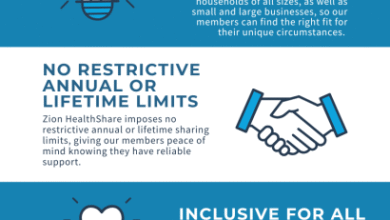Health Shares Explained: How To Decide If It’s Right For You
At its core, a health share is a group of people coming together to share in each other’s medical expenses. This system is a proven effective alternative to traditional health insurance. While health sharing has benefited hundreds of thousands of Americans, it may not be the best fit for everyone. As many Americans know, taking care of your health isn’t just about choosing a good doctor and eating healthy, many factors contribute to choosing the right option. Choosing the right healthcare membership is an important and often confusing decision that impacts your physical and financial health. In this blog, we’ll explore what health shares are, their benefits, and considerations to help you determine if they’re right for you.
What is a Health Share?
Typically, health share organizations are non-profit, meaning they focus on serving the public rather than making a profit for owners. Any money earned is reinvested back into the organization’s mission. Members who join a health share contribute monthly to be used for the qualified medical expenses of other members.
Health shares are governed by established guidelines or principles that each member agrees to upon joining. These guidelines outline what medical expenses can be shared into by the community and establish standards community members adhere to. Anyone considering joining a health share should thoroughly review the associated guidelines to ensure the program aligns with their needs and expectations.
The health share organization itself acts as a facilitator of these contributions, collecting and distributing payments based on the member guidelines. It also ensures all members abide by the agreed upon guidelines to protect community contributions from misuse. An example of a Health Share’s Member Guidelines can be found here. An essential aspect of a health share organization is the emphasis on community and supporting others in their medical expenses.
Benefits of Health Shares
It is no secret that many Americans are frustrated with traditional insurance options. Most of these concerns are centered around cost, networks, and coverage. The health share model provides an alternative that answers many of these issues presented by traditional insurance. These benefits can be appealing to both individuals and families seeking more options tailored to their needs. Let’s look at our top benefits for joining a health share.
One of the most significant benefits of health share membership is the potential for cost savings. Unlike traditional insurance plans burdened by high administrative costs and profit margins, the nonprofit nature of health share organizations allows for lower monthly contributions. Health share memberships also provide greater flexibility in choosing healthcare providers, as there are usually no network restrictions. This flexibility empowers healthcare consumers to make choices that best suit their needs. If a member determines the cost of a provider to be unreasonable, they can easily seek another option without being limited by a network, which keeps costs low for the health share community.
According to a recent poll by the Kaiser Family Foundation, about half of adults covered by a health insurance plan worry about affording their monthly insurance premiums. The non-profit nature of health share organizations is a key factor in keeping these costs lower than traditional insurance premiums. Since health shares aren’t paying high administrative expenses and profits are returned to the community, monthly contributions remain affordable.
As mentioned, many health share organizations operate outside of networks, though this is not universal and should be considered when comparing options. The absence of a network provides members with greater flexibility in choosing healthcare providers and services. Members typically inform their medical provider that they are self-pay patients, which often results in self-pay discounts that help regulate costs shared by the health share community.
Since service costs are lower with these discounts, community funds are not depreciated as quickly, enabling health shares to maintain low monthly contributions. When members make informed decisions about their provider and associated costs, they positively impact and protect community resources.
Considerations Before Joining a Health Share
While there are numerous benefits to joining a health share, it’s crucial to be aware of some important factors as you explore your options. For some individuals a health share membership isn’t realistic due to a high demand for medical health needs. Recognizing the differences between traditional insurance and a health share is necessary to make an informed decision and to maximize the benefits of whatever option you choose. Each health share is a little different visit this HealthShare guide to compare health shares.
*Please note: This health share comparison guide is intended to provide general information and may not reflect the most current details. Health share memberships and regulations can change over time. It is essential to contact individual health share organizations directly to verify details, eligibility criteria, and any other relevant information before making a decision.
Here are a few things you need to know when reviewing health share memberships.
Understanding the Guidelines
Before joining a health share, be sure to read and understand their guidelines. Each health share has their own set of rules that govern which medical expenses are eligible for sharing. Make sure you are comfortable with these guidelines and that they align with your healthcare needs and expectations. Health shares typically encourage healthy lifestyle choices, which may also impact their guidelines. Healthier members contribute to lower costs for the community. Be sure to understand what is expected of you as a member.
Pre-Existing Medical Conditions
When exploring health share options, it’s important to be honest about your medical history and needs. Some health share memberships have waiting periods for pre-existing medical conditions or specific limitations on sharing. If you or a family member have a chronic or pre-membership condition, it’s imperative to understand how a health share manages and shares into these conditions. Some may not share in any expenses related to that medical need, while others may share up to a certain amount. Since each health share manages these conditions differently, carefully review their guidelines and ask questions related to your medical needs.
Personal Health Needs
The most important consideration is your own personal health needs. As you explore health share options, consider how your health needs align with the offerings of the health share. Prescription medication services vary between each health share. Be sure you understand the related options with each health share you explore. Some may offer discounts on medications, have a prescription service or may not share into medications at all. With differences in each health share’s ability to work with prescriptions, it’s important to be aware before you need it.
Conclusion
Health share organizations offer a unique approach to healthcare that emphasizes community and shared responsibility. By understanding the core principles, benefits, and potential limitations, you can make an informed decision about whether a health share aligns with your healthcare needs and financial goals.
While a health share membership may not be the ideal solution for everyone, they provide a viable alternative for those seeking to manage healthcare costs and prioritize personalized care. It’s essential to conduct thorough research and compare different plans to find the best fit for your individual circumstances.
Ultimately, the choice of healthcare coverage is a personal one. By exploring all available options, you can make an informed decision that empowers you to take control of your health and well-being.
To learn more about Zion HealthShare, visit our website at or contact our Member Care team at 888-920-9466.


